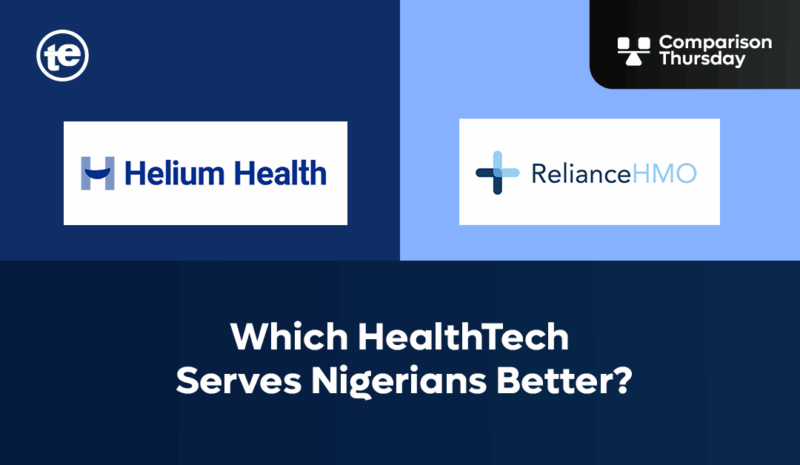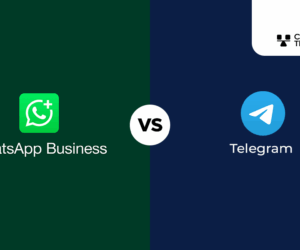It’s 2025 and Nigeria still spends less on health than it does on political campaigns. The government allocates just 4% of GDP to healthcare, a far cry from the 15% recommended by the World Health Organisation.
Meanwhile, in rural communities, one doctor is expected to look after 5,000 patients. If that doesn’t feel like a national crisis, perhaps this will: Nigerians spend an average of N5,200 every month on self-medication because they simply cannot trust hospitals to be there when they need them.
However, in the middle of this dysfunction, we’ve selected two HealthTech brands who are torchbearers for a broken system; Helium Health and Reliance HMO.
Both founded in 2016, both funded by global investors, both leveraging technology. But they serve completely different corners of the healthcare puzzle: one is wiring up hospitals with digital infrastructure, the other is selling ordinary Nigerians something close to peace of mind. So, the question? Which one serves Nigerians better?
The Context: Digital Health as a Lifeline
Globally, digital health has gone beyond being experimental. The market is projected to hit $660 billion by the end of 2025, growing at nearly 25% annually since 2019. Artificial intelligence alone is set to contribute over $102 billion by 2028.
In Nigeria, the digital health market will reach $645 million this year, driven by smartphone penetration, improved internet, and the government’s goal to digitise 70% of health records by 2025.
On the demand, 70% of Nigerian doctors now use some form of healthtech tool. Patients are booking virtual consultations more, and insurers are relying on apps to reduce paperwork. Against this backdrop, Helium Health and Reliance HMO have risen to prominence.
Leadway vs. AIICO: A Review of their Digital Strategies in a Low-Penetration Insurance Market
Helium Health: Building the Rails
Helium Health is the backbone of African hospitals with an indispensable product: Electronic Medical Records (EMR) and Hospital Management Information Systems (HMIS).
These systems replace dusty paper files with digital dashboards, automate billing, manage drug inventories, and streamline appointments.
Helium Health has raised $42.2 million to date and now operates in Nigeria, Ghana, Liberia, Senegal, Cameroon, Uganda and Kenya. Its acquisition of Meddy in 2021 and development of HeliumDoc allowed it to integrate AI-powered tools for telemedicine, doctor discovery, automated workflows and patient engagement tools. Through its HeliumCredit product, it also offers financing to hospitals starved of liquidity.
Hospital administrators commend Helium Health for one thing: control. With over 1,000 facilities onboarded and thousands of clinicians using its software, it has become the quiet enabler of efficiency in a chaotic system. The average patient may never hear of it, but without Helium, many hospitals would still be filing patient data in dusty cabinets.
Reliance HMO: Delivering the Ride
Reliance HMO sits on the other end, highly visible, customer-facing, and almost evangelical about access. Unlike Helium, Reliance doesn’t build tools for hospitals. It sells health insurance plans directly to individuals, families, and businesses, plans that truly work.
With $51.1 million raised so far, Reliance has built a provider network of over 2,600 hospitals in Nigeria and 3,800 globally. Its platform gives users telemedicine, cashback incentives for unused plans, and transparent, flexible options like the Red Beryl plan at ₦38,650 annually. For many SMEs and startups, this affordability is the difference between employees being insured or not at all.
Customer feedback usually highlights its quick claims process, responsive support team, and user-friendly mobile app. Reliance has also pushed innovation in chronic care, piloting programmes in diabetes management that reduced fasting blood sugar levels by 12% for participants.
In short, Reliance is the brand patients see, touch, and trust.
Head-to-Head Comparison
| Category | Helium Health | Reliance HMO |
| Core Focus | Digitising hospitals (B2B) | Delivering health plans (B2C) |
| Strength | EMR, HMIS, hospital financing, interoperability | Telemedicine, flexible plans, cashback incentives |
| Reach | 1,000+ hospitals across 7 countries | 2,600+ providers in Nigeria, 200k+ enrollees |
| Funding | $42.2m | $51.1m |
| Users | Healthcare providers, governments | Individuals, families, SMEs |
| Visibility | Backend—patients rarely see it | Frontend—patients interact daily |
| Innovation | HeliumCredit, AI integration, data for policy | Diabetes care pilots, preventive care, digital claims |
| Limitation | Adoption depends on hospital buy-in | Affordability in Nigeria’s inflationary climate |
Which Serves Nigerians Better?
This is not a straightforward fight. Helium Health is the engine room, Reliance HMO is the frontline face. Helium ensures hospitals can run efficiently; Reliance ensures patients can actually access care. One is building the rails, the other is driving the train.
If you’re a hospital administrator, here’s your answer: Helium Health is the partner you need. If you’re an HR manager trying to insure your staff, Reliance HMO is the obvious choice. In reality, Nigerians need both, because infrastructure without access is meaningless, and access without strong infrastructure collapses quickly.
Nigeria’s health sector will not be saved by government spending alone. It will be saved by fierce experiments like Helium Health and accessible models like Reliance HMO. Each represents a different strategy to solve the same problem: how to give Nigerians dignified, affordable, and reliable healthcare.
So, which serves Nigerians better? The answer depends on where you stand. But if both continue to grow and eventually intersect, the biggest winners won’t be the companies, it will be the patients who, for once, might actually find the system working in their favour.
![]()











